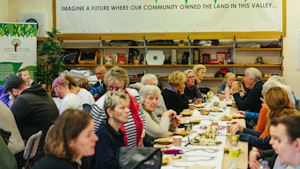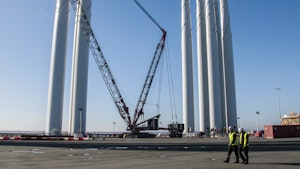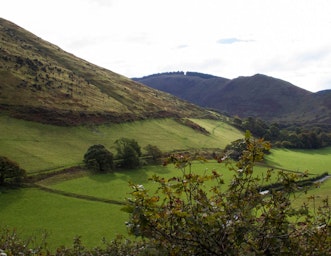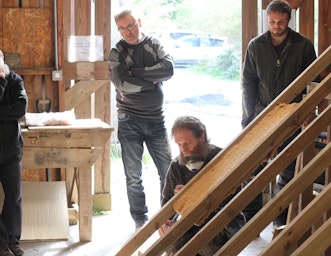
As we move towards a Zero Carbon Britain, how can we ensure that livelihoods are protected and communities thrive? Tanya Hawkes explores lessons from history.

In 1982 my dad walked out of the gates of the Gloucester Iron and Steel Foundry for the last time. He and hundreds of other men and their families were left searching for scarce ‘low skilled’ work to replace lost livelihoods.
Families fared differently according to personal circumstances. Mine, because my parents were raising a severely disabled child and were already only just coping with the tiredness and stress, was hit hard. My dad suffered a severe stroke in his mid-forties and couldn’t work properly again. The poverty caused during that time is still affecting my family two generations later, in complex ways. We became part of the statistics of what is now familiarly known as ‘deindustrialisation’, and I witnessed first hand the devastation caused by abrupt economic changes to an industry with no transition plan for the affected people and communities.
This isn’t a misery memoir, but rather a cautionary economic tale. My family’s experience was replicated across communities all over the UK. From the mining towns of Wales and Durham to the steelworks of Sheffield, mass unemployment, outward migration of young people and lack of alternative job creation created pockets of persistent poverty and economic repercussions across whole regions.
Coal production employed a million people at its peak. Current agricultural employment is less easy to quantify, but the Annual Population Survey suggests 346,000 permanent workers, and DEFRA calculates another 64,000 seasonal, gang and migrant workers on top of this. The iron and steel industry employed 323,000 people in 1971 and now employs less than a tenth of that at 31,900. Aviation and other transport accounts for hundreds of thousands of jobs all around the UK. The human cost of what happens when some industries decline while others prosper is a key issue for those of us working towards a zero carbon society.
Protecting workers and communities
Achieving a zero carbon Britain will involve changes to industries that people and communities rely on to survive, such as the aviation industry, North Sea oil and gas, transport, construction and agriculture. Certain workers in those industries will be more affected than others. Some transport jobs are already low carbon and can easily transition further. A large proportion of their workers are well unionised and protected.
Other industries are more vulnerable to market competition, non- unionised and not easily transitioned to low carbon alternatives – aviation and oil for example – and would require government intervention to support and retrain workers and provide economic safety nets through any transitions.
In the UK the Trades Union Congress, states that despite the ‘opportunities’ that decarbonisation offers, there is a lack of strategy for a just transition for industry and that “highly skilled, unionised jobs, are under threat.”
Pre-COVID-19, 4.8 million people in the UK were classed as self-employed, and nearly a million of these worked in the construction industry. Around 45,000 Uber drivers worked in London. A just transition in the UK needs to include all the stakeholders in the process: communities, local people and workers in industry. How the voices and views of this rising, non-unionised and vulnerable workforce are heard and represented is exactly the kind of challenge a just transition faces.
Globally, the unions and environmental justice groups forged the just transition movement, usually made up of people on low incomes and people of colour. Recognising that extractive industries may provide jobs, but only do so at great cost to human health and the environment, they saw that a transition was needed, and that this should be led by those most affected.
The Green New Deal, originally a concept coined by the UK New Economics Foundation, and now a global movement, is just one of the evolving blueprints for a just economic transition, and many NGOs, environmental justice groups, unions and political parties are involved in developing a just transition to low carbon industries.
The United Nations 2015 Paris Agreement takes into account ‘the imperatives of a just transition of the workforce and the creation of decent work and quality jobs.’

Restoring an ex-mining area in Wales
In the ex-mining town of Treherbert in Rhondda Cynon Taff, a forestry project is taking off that is aiming to grow timber for use in buildings, create space for growing and leisure activities, and support the creation of 100-200 long-term, secure, low carbon jobs.
Skyline is a project in one of three areas in Wales exploring the potential for the local community to plan for their future, environmentally and economically and for generations to come. Timber production and forestry management is one way that these communities can transition to a low carbon industry that combines long-term quality employment, low carbon solutions for the construction industry and a healthy environment for the local area.
It’s an example of the Welsh Government, Natural Resources Wales and community interest groups working together to create change. Whilst the project can’t undo decades of economic harm caused to the area by the decline of coal, it might be able to undo some of the environmental harm caused by coal mining, and be used as a blueprint that could be scaled up in the future as a way of creating change that benefits the climate, local biodiversity and people’s livelihoods.
The docks at Hull and Grimsby
Both docks thrived in the early 20th Century. Coal was imported and exported from Hull. Coal power stations along the Humber estuary earned it the name ‘megawatt valley’. Grimsby was a major fishing port. The end of coal mining and the phase out of coal generation led to industrial decline. The Grimsby fishing fleet collapsed in the 1970s.
Both Hull and Grimsby ports are now major sites of the offshore wind industry. Both ports have become important parts of the UK marine renewables infrastructure – providing port facilities for the construction and maintenance of offshore wind arrays in the North Sea.
However it’s not clear that the new jobs created by this are benefiting the people who lost work during the end of coal mining, coal power phase-out or the collapse of the fishing industry.
A just transition could take this into consideration at the beginning of a winding down process, involving affected stakeholders and planning for distributional and procedural justice, looking at who benefits and loses from new industry, and how and by whom the process of change is decided. Because time has passed, the area might be a case for restorative justice, which aims to retrospectively invest in and support an affected community.
The low carbon jobs of the future
My dad took a job as a care worker for people with learning disabilities after his redundancy. My mum was raising a disabled child, full time, with the help of disability benefits. I worked as a carer myself for several years when I left school and college. These are also low carbon jobs.
Recently COVID-19 has shone a light onto work that is essential and useful but often overlooked. Low carbon jobs are in renewables, agriculture, forestry and transport, but they are also in elderly and disability care, health and teaching.
COVID-19 will hopefully force a rethink of what constitutes essential and useful work. It has also shown us how fast government intervention can be brought to bear in a social and economic crisis. Solving climate change also offers us the chance to invest in people and in building back a better society – with work that is meaningful, useful to society and low carbon.

Do you have stories of what a just zero carbon transition looks like? Is your area already working on a just transition? We’d love to hear from you. Contact Tanya Hawkes tanya.hawkes@cat.org.uk to tell us about your work.
About the author
Tanya Hawkes is part of CAT’s fundraising team. She is currently researching a just zero carbon transition as part of the CAT MSc in Sustainability and Adaptation. References and further reading available on request.
Did you know that CAT is an educational charity?
Please consider supporting our work by becoming a member.
- Zero Carbon Britain
- Climate Change
- Education
Related Topics
Related Pages
Related news



CAT Conversations: Sandy Stevens, CAT graduate
17th April 2025
CAT stories – Nick Parsons and Mike Russell
29th January 2025Email Sign Up
Keep up to date with all the latest activities, events and online resources by signing up to our emails and following us on social media. And if you'd like to get involved and support our work, we'd love to welcome you as a CAT member.
